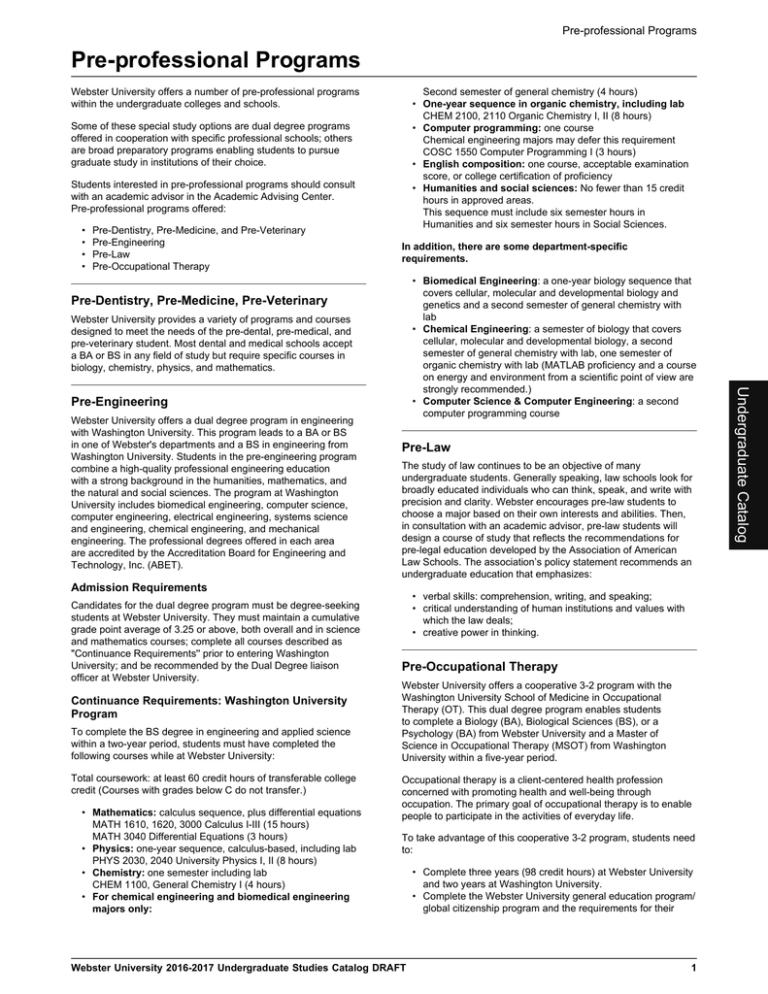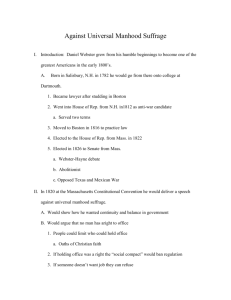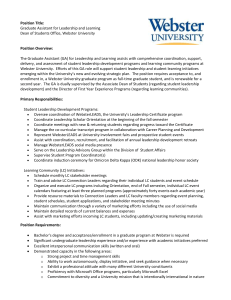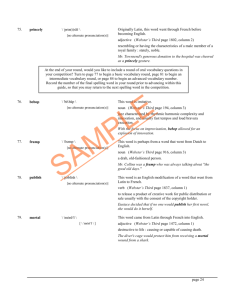Pre-professional Programs
advertisement

Pre-professional Programs Pre-professional Programs Webster University offers a number of pre-professional programs within the undergraduate colleges and schools. Second semester of general chemistry (4 hours) • One-year sequence in organic chemistry, including lab CHEM 2100, 2110 Organic Chemistry I, II (8 hours) • Computer programming: one course Chemical engineering majors may defer this requirement COSC 1550 Computer Programming I (3 hours) • English composition: one course, acceptable examination score, or college certification of proficiency • Humanities and social sciences: No fewer than 15 credit hours in approved areas. This sequence must include six semester hours in Humanities and six semester hours in Social Sciences. Some of these special study options are dual degree programs offered in cooperation with specific professional schools; others are broad preparatory programs enabling students to pursue graduate study in institutions of their choice. Students interested in pre-professional programs should consult with an academic advisor in the Academic Advising Center. Pre-professional programs offered: • • • • Pre-Dentistry, Pre-Medicine, and Pre-Veterinary Pre-Engineering Pre-Law Pre-Occupational Therapy In addition, there are some department-specific requirements. Pre-Dentistry, Pre-Medicine, Pre-Veterinary Webster University provides a variety of programs and courses designed to meet the needs of the pre-dental, pre-medical, and pre-veterinary student. Most dental and medical schools accept a BA or BS in any field of study but require specific courses in biology, chemistry, physics, and mathematics. Pre-Engineering Webster University offers a dual degree program in engineering with Washington University. This program leads to a BA or BS in one of Webster's departments and a BS in engineering from Washington University. Students in the pre-engineering program combine a high-quality professional engineering education with a strong background in the humanities, mathematics, and the natural and social sciences. The program at Washington University includes biomedical engineering, computer science, computer engineering, electrical engineering, systems science and engineering, chemical engineering, and mechanical engineering. The professional degrees offered in each area are accredited by the Accreditation Board for Engineering and Technology, Inc. (ABET). Pre-Law The study of law continues to be an objective of many undergraduate students. Generally speaking, law schools look for broadly educated individuals who can think, speak, and write with precision and clarity. Webster encourages pre-law students to choose a major based on their own interests and abilities. Then, in consultation with an academic advisor, pre-law students will design a course of study that reflects the recommendations for pre-legal education developed by the Association of American Law Schools. The association’s policy statement recommends an undergraduate education that emphasizes: Admission Requirements Candidates for the dual degree program must be degree-seeking students at Webster University. They must maintain a cumulative grade point average of 3.25 or above, both overall and in science and mathematics courses; complete all courses described as "Continuance Requirements'' prior to entering Washington University; and be recommended by the Dual Degree liaison officer at Webster University. Continuance Requirements: Washington University Program To complete the BS degree in engineering and applied science within a two-year period, students must have completed the following courses while at Webster University: Total coursework: at least 60 credit hours of transferable college credit (Courses with grades below C do not transfer.) • Mathematics: calculus sequence, plus differential equations MATH 1610, 1620, 3000 Calculus I-III (15 hours) MATH 3040 Differential Equations (3 hours) • Physics: one-year sequence, calculus-based, including lab PHYS 2030, 2040 University Physics I, II (8 hours) • Chemistry: one semester including lab CHEM 1100, General Chemistry I (4 hours) • For chemical engineering and biomedical engineering majors only: • verbal skills: comprehension, writing, and speaking; • critical understanding of human institutions and values with which the law deals; • creative power in thinking. Pre-Occupational Therapy Webster University offers a cooperative 3-2 program with the Washington University School of Medicine in Occupational Therapy (OT). This dual degree program enables students to complete a Biology (BA), Biological Sciences (BS), or a Psychology (BA) from Webster University and a Master of Science in Occupational Therapy (MSOT) from Washington University within a five-year period. Occupational therapy is a client-centered health profession concerned with promoting health and well-being through occupation. The primary goal of occupational therapy is to enable people to participate in the activities of everyday life. To take advantage of this cooperative 3-2 program, students need to: Webster University 2016-2017 Undergraduate Studies Catalog DRAFT • Complete three years (98 credit hours) at Webster University and two years at Washington University. • Complete the Webster University general education program/ global citizenship program and the requirements for their 1 Undergraduate Catalog • Biomedical Engineering: a one-year biology sequence that covers cellular, molecular and developmental biology and genetics and a second semester of general chemistry with lab • Chemical Engineering: a semester of biology that covers cellular, molecular and developmental biology, a second semester of general chemistry with lab, one semester of organic chemistry with lab (MATLAB proficiency and a course on energy and environment from a scientific point of view are strongly recommended.) • Computer Science & Computer Engineering: a second computer programming course Pre-professional Programs Pre-professional Programs undergraduate major at Webster (Biology BA, Biology BS, or Psychology BA) prior to entering the Washington University program. • Apply to the Washington University School of Medicine Occupational Therapy Program. Most students apply in early fall of their junior year. A summary of the application requirements are listed below. The following admission requirements were current at the time of printing. Interested students should examine the materials on the Washington University site to make sure they have the most current set of admission requirements (http://www.ot.wustl.edu/ education/3-2-program-143). • 3.25 cumulative GPA is required for admission into the MSOT program. • Complete (grade of B or better) a set of prerequisite courses (Life Science, Physiology, Developmental Psychology, Abnormal Psychology, Psychological Statistics, and a Social Science Elective) prior to admission to the occupational therapy program. • Complete a minimum of thirty hours of OT-related experience or observation. It is strongly recommended, but not required, that a portion of the hours include observation with an OT. • Complete the GRE within the last five years. Current scores are available on the Washington University adminission site. However, GRE scores are one of many factors considered in the admissions process. • Request three letters of recommendation - one from a faculty member or academic advisor, one from someone involved in your observation experience, and one from another person of your choice (not a family member or friend). • Demonstrate an understanding of OT and exhibit excellent writing skills in the application essay. • Participate and evidence leadership in extracurricular activities. • International students: TOEFL and TWE taken no more than one year prior to application. • Students should have completed four of the six MSOT prerequisite categories at the time of their application to the MSOT program at Washington University (typically in early fall of their junior year), and will complete the remaining two by the end of the fall semester of their junior year at Webster University. • Your application and three letters of recommendation must be submitted to OTCAS (centralized application system) by December 15th of your junior year at Webster. Official GRE scores must also be received by Washington University by that date. See the Washington University site for more information (http:// www.ot.wustl.edu/education/3-2-program-143). The MSOT prerequisite courses at Webster University are: • BIOL 3010/3011 Anatomy and Physiology I (4 hours)* (Life Science, Physiology) • BIOL 3020/3021 Anatomy and Physiology II (4 hours) (Physiology) • PSYC 2300 Lifespan Development* (3 hours) (Developmental Psychology) • PSYC 2750 Introduction Measurement and Statistics (3 hours) (Psychological Statistics) • PSYC 3125 Abnormal Psychology* (3 hours) (Abnormal Psychology) • Social Science Elective (ANTH, ECON, POLT, PSYC, SOCI) (3 hours) (Social Science) *Students must meet the required prerequisites for these courses at Webster. 2 Webster University 2016-2017 Undergraduate Studies Catalog DRAFT






